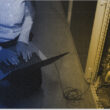India’s manufacturing sector is a powerhouse, driving economic growth and innovation. But even the most secure facilities are not immune to the risk of burglary or theft. These incidents can cripple production, cause financial losses and disrupt operations. This blog explores the five compelling reasons why Burglary Insurance is a must-have for manufacturers in India. By understanding the importance of Burglary Insurance, manufacturers can take a proactive step toward securing their assets.
Burglary Insurance: A Brief Overview
Burglary Insurance is a type of property insurance that provides coverage against losses resulting from theft or burglary. This insurance product is specifically designed to protect businesses from the financial impact of theft-related incidents. It typically covers losses incurred due to the theft of valuable assets, including cash, inventory, equipment, and other property. In the event of a burglary, the policyholder can file a claim with their insurance provider to receive compensation for the stolen items, up to the limits specified in the policy. Burglary insurance helps mitigate the financial risks associated with theft. Thus, it offers peace of mind to individuals and businesses by providing a safety net against the unexpected loss of property due to criminal activities.
Top 5 Reasons Why the Manufacturing Industry Needs Burglary Insurance
Here are the top five reasons why the manufacturing industry in India needs fire and Burglary Insurance-
1. Protection of assets: Manufacturing units house expensive machinery, raw materials, finished goods, and other valuable assets. These assets are vulnerable to theft or burglary, which can result in substantial financial losses. Fire & Burglary Insurance provides coverage for such losses, ensuring that the manufacturing facility can recover and resume operations swiftly. Whether it’s theft of raw materials, equipment, or finished products, having adequate insurance coverage safeguards the assets. It also minimizes the financial impact on the business.
2. Mitigation of financial losses: A burglary incident can have severe financial repercussions for manufacturing businesses. Apart from the loss of physical assets, there are additional costs such as repairs, replacements, and operational downtime. These costs can accumulate quickly, potentially crippling a manufacturing unit. This is particularly true for small or medium-sized enterprises (SMEs). Burglary Insurance offers financial assistance to cover these expenses, thereby mitigating the overall financial losses incurred by the business. This ensures that the manufacturing operation can continue without facing a significant strain on its finances.
3. Risk management in highly theft-prone areas: Certain regions or localities in India may have higher rates of theft or burglary compared to others. Manufacturing units located in such areas face an increased risk of being targeted by criminals. For businesses operating in these areas, Fire and Burglary Insurance becomes indispensable. It provides a layer of risk management, offering financial protection specifically tailored to the heightened threat of burglary. By securing comprehensive insurance coverage, manufacturing companies can operate with greater peace of mind. This is because they know that they are financially safeguarded against potential losses arising from theft incidents.
4. Maintaining business continuity: Disruption to operations due to burglary can have cascading effects on the entire manufacturing supply chain. It can lead to delays in fulfilling orders, loss of customer trust, and damage to the company’s reputation. Burglary Insurance plays a crucial role in maintaining business continuity by enabling swift recovery post-incident. With insurance coverage in place, manufacturing businesses can expedite the process of repairing or replacing stolen assets. This can help minimize downtime and ensure continuity in production & supply chain activities. This not only helps in retaining existing customers but also in preserving the company’s reputation in the market.
5. Stakeholder confidence: In many cases, having Burglary Insurance may be a prerequisite for compliance with contractual obligations. Agreements with suppliers or clients may mandate the procurement of adequate insurance coverage against theft or burglary. Failure to comply with these requirements can result in loss of business opportunities. By investing in Burglary Insurance, manufacturing companies demonstrate their commitment to risk management, thereby enhancing stakeholder confidence. These stakeholders can include investors, lenders, and business partners who seek assurance regarding the company’s ability to mitigate risks effectively.
The Footnote:
From the discussion above, we have seen that Burglary Insurance can be a vital risk management tool for the manufacturing industry in India. With the sector’s continuous growth and increasing investment in infrastructure and technology, the need for comprehensive insurance coverage against burglary has become more pronounced. Burglary Insurance allows manufacturing businesses to navigate the challenges posed by theft or burglary incidents with resilience and confidence.
Frequently Asked Questions
What kinds of risks do manufacturing businesses face in terms of burglary and theft?
Manufacturing businesses can face several risks related to burglary and theft due to the nature of their operations and the valuable assets they possess. These risks include theft of expensive machinery and equipment, pilferage of raw materials and finished goods, break-ins targeting warehouses or storage facilities and internal theft by employees. Additionally, the large-scale operations and diverse supply chains of manufacturing units make them susceptible to organized theft and vandalism. All these can pose significant financial and operational challenges to the business.
What factors should a manufacturing business consider when choosing a Burglary Insurance Policy?
When choosing a Burglary Insurance Policy, a manufacturing business should consider several key factors to ensure adequate coverage. These include the value of their assets, including machinery, equipment, inventory, and raw materials, as well as the location of their facilities and the level of security measures in place. Additionally, businesses should assess the potential financial impact of a burglary incident on their operations, including replacement costs, downtime, and loss of revenue. It’s crucial to review policy terms and coverage limits carefully, considering any exclusions or limitations that may affect the scope of protection provided. Finally, businesses should also evaluate the reputation and financial stability of the insurance provider to ensure reliability in case of a claim.








